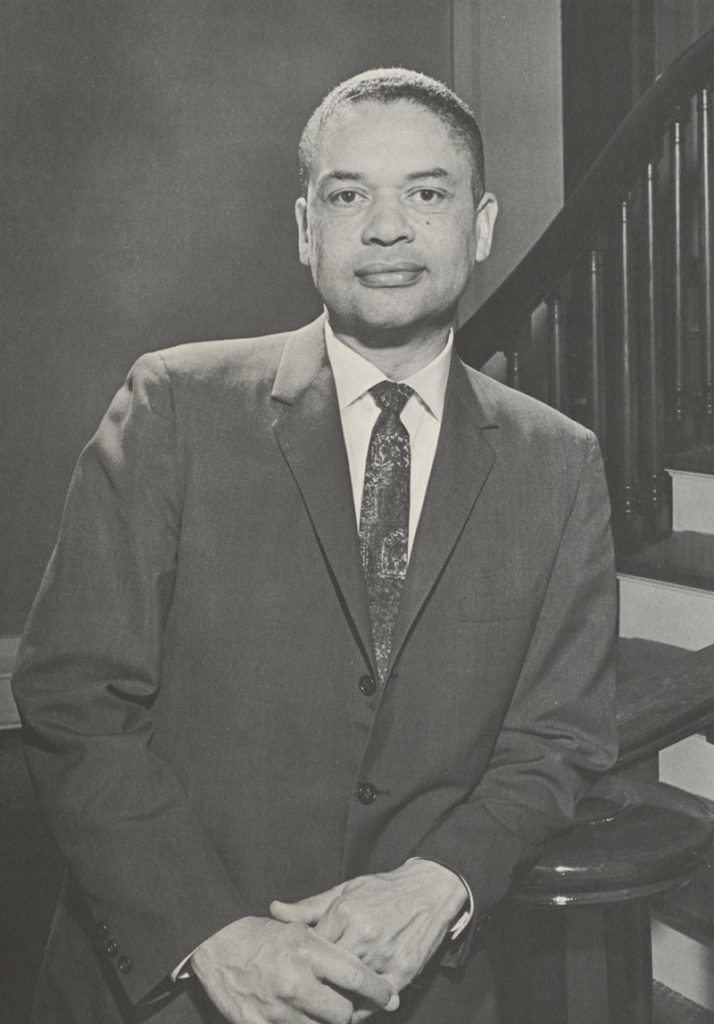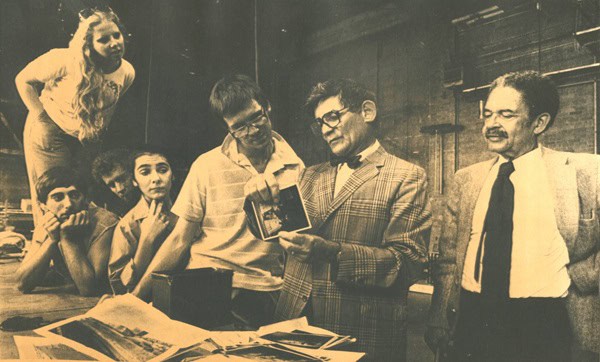The following is written by Olson Graduate Research Assistant Anne Moore.

Phillip G. Hubbard was an engineering professor, administrator, civil rights champion, and distinguished member of the University of Iowa community. He was the first Black professor at the university and spent more than 40 years advocating for students and providing counsel to six presidents. In 1971, he became the first Black vice president at any Big 10 university.
Hubbard was born in Missouri in 1921, but his mother moved the family to Des Moines, Iowa—where the schools were desegrated—so her children could have a better education. Hubbard attended North High School and shined shoes to save up money for college. He first came to the UI as an undergraduate student in 1940, when the university was still largely, if informally, segregated. Black men were excluded from university housing, and all students of color were discouraged from using the cafeteria and attending social events. Like many Black male students, Hubbard lived with a local Black family during his undergraduate years because of housing discrimination in Iowa City. Years later, Hubbard and his wife, Wynonna, would welcome Black students into their own home.
In 1943, Hubbard enlisted in the Army reserves but eventually returned to the UI to finish his BS in electrical engineering, graduating with honors in 1947. That same year, he was hired by the university as a research engineer, making him the first Black faculty member at the UI. He went on to earn an MA in hydraulics and mechanics, a PhD in engineering, and became an assistant professor in 1954.
As the civil rights movement reached its peak throughout the United States, Hubbard helped to found the Committee on Human Rights to combat housing and employment discrimination at the UI and in Iowa City. They investigated complaints and lobbied for Fair Housing ordinances, which were adopted by the city in 1964.
Hubbard was appointed dean of academic affairs at the UI in 1966, becoming the first Black administrator at a university in the state of Iowa. In 1971, he was named vice president of student services. During his leadership tenure, he was a staunch advocate for students of all walks of life. He fought for better undergraduate support and engagement and was admired on campus for his willingness to listen to student concerns. His steady relationship with students helped see the university through the turbulence of the Vietnam War and protests that rocked the campus.
In 1967 Hubbard spearheaded the Rust, Iowa, and Le Moyne for Expanding Educational Horizons (RILEEH) program, which created partnership between the UI and predominantly Black colleges in the rural south. RILEEH facilitated student exchanges, teacher training, and graduate research to help support under-resourced academic institutions in Mississippi and Tennessee. Later, Hubbard would recruit faculty from these same institutions to help build the emerging Afro-American studies program.
As part of his work to promote cultural studies at UI, Hubbard chaired a newly created committee on Afro-American studies in 1968. He encouraged students of all backgrounds to take classes in this emerging field. He saw inclusivity and cultural competency as vital in higher education, believing the university should produce well rounded students who are prepared to live and work in a diverse world. He advocated for the Afro-American Cultural House and the Chicano Indian American Cultural Center (now called the Latino Native American Cultural Center), understanding the importance of creating a welcoming and supportive environment for minority students.
To that end, Hubbard created Opportunity at Iowa in 1987, a program aimed at increasing diversity at the university through the recruitment and retention of minority students and faculty. This included scholarships, outreach to underserved public schools in Iowa, and summer workshops for highschoolers.
After more than 40 years of service, Hubbard retired from the UI in 1990, though he continued to advise Opportunity at Iowa. A year later, Union field (located south of the Iowa Memorial Union) was renamed Hubbard Park in his honor. In 2001, he received a lifetime achievement award from the Iowa City Human Rights Commission.

Hubbard passed away in 2002 at the age of 80. Today numerous scholarships, medals, and awards bare the Hubbard name, including the Philip G. Hubbard Human Rights Award and the Wynonna G. Hubbard Scholarship. As we reflect on his life and legacy, we should strive to honor Hubbard’s commitment to human rights and his dedication to uplifting students of all backgrounds.
To learn more, view the finding aid for the Phillip G. Hubbard Papers (RG99.0248), or visit us in person or online at the Iowa Digital Library. You can also search the Daily Iowan archives for articles on Phillip Hubbard’s work, or check out his autobiography My Iowa Journey: The Life Story of the University of Iowa’s First African American Professor on InfoHawk+.

